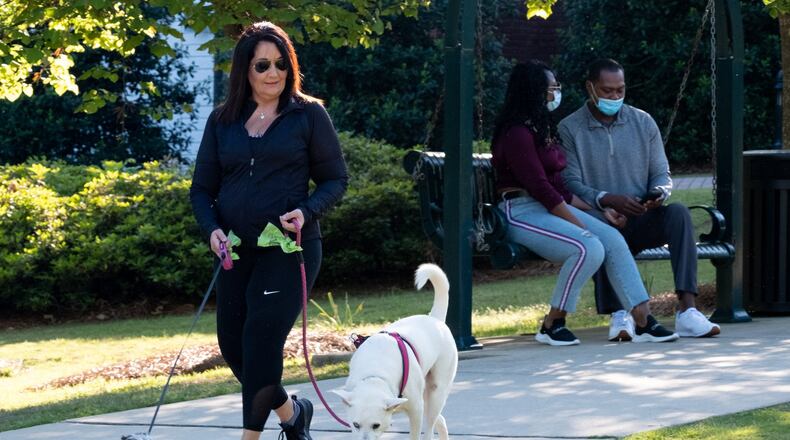As spring break drew near, the 23 employees of Dena Harmon’s pet care business were looking forward to full days and nights ending with fat paychecks and tips.
The coronavirus pandemic made short work of those dreams. The cancellations started pouring in to Paws Amore Animal Care the first weekend in March, as schools and companies shut down and travel plans were scrapped. And they continued until Harmon’s fully booked calendar was wiped clean and business was at a near standstill.
Pet Care companies like Paws Amore are among thousands of service companies — from restaurants to nail salons — that have become extraneous with so many people out of work or sheltering at home.
Harmon refunded $30,000 in pet-sitting reservation down payments.
Still, Harmon paid her 11 full-time workers and the part-timers she kept on, even though she had just moved into a new home.
“Along with the move, it depleted all my personal reserves and the business reserves,” she said. “I went from pretty secure, and with a couple of months of expenses in the bank, to living paycheck to paycheck, with no paycheck.”
Pet care jobs are growing much faster than average and had been projected to increase by 16% by 2028, according to the Bureau of Labor Statistics. Nationwide in 2018, the industry employed 330,900.
Pet care is a $10 billion yearly business, according to the American Pet Products Association.
Anne Blanton, owner of Brookhaven Barks, employed 13 workers when the shutdown hit.
“We had just hired one guy and were getting him trained for spring break and summer, and he chose to do DoorDash (restaurant) deliveries instead. I want him back when this is over,” she said. Another two employees also found other jobs.
There is a trickle of business coming in from disabled pet owners and people who still go to work such as health-care employees and firefighters. “We do have enough to keep two people full-time,” Blanton said.
“I have not taken pay the last couple of periods. And I’m living off my savings right now,” she said.
“If we get back by June, I’ll be fine. If it goes longer, I may be looking for something. Maybe I’ll be the DoorDash person,” she said.
Julie Kniedler went to work part-time for Harmon’s Paws Amore about a year ago. She loves the work so much she left a 13-year, full-time career as a retail manager in January to become the office manager. Kniedler was a Pennsylvania teenager when the 9/11 attacks occurred, and her mom was one of the social workers who helped survivors deal with that tragedy. That gave her insight on hard times.
“Now that something like this has happened, I understand myself how we are very much meant to be here for one another,” she said. “I am here for Dena. I want to keep her strong and to make sure other sitters are doing OK.”
Kniedler was in California as she was talking. She had just delivered a dog to the West Coast from Atlanta by car. If there is a bright spot in this for Paws Amore, it is in its pet transportation business. Many airlines have stopped transporting animals.
Since the pandemic started, there have been some positives for animals.
Nationally, the number of animals taken to shelters in March dropped 24%, and euthanizations by 25%, according to a survey of 1,127 animal welfare organizations by the Association for Animal Welfare Advancement.
Many shelters locally are reporting fewer animals and fewer euthanizations.
“Adoptions are pretty steady, maybe up slightly,” said Ross Cavitt, a spokesman for Cobb County.
Many shelters are limiting hours and visitation.
“Because we are by appointment only, it seems like those who come in are more intent on adopting. But the number of turn-ins is way down. … and our dog population is at only 90 right now, which our shelter director described as “way low,” Cavitt said.
Atlanta Humane Society locations are closed, but it is taking adoption applications on the website, then setting up meetings between animals and people, said Christina Hill, who works there. Interest in adopting or fostering pets is way up, with the agency receiving thousands of calls or emails, she said.
“People are looking for a way to help and for a companion to have. And it’s a great time to adopt a pet. People are at home and can have time to bond with a pet,” she said.
More pets could be good news for Harmon, when the business comes back. She was among the lucky small business owners who applied early for federal disaster relief grants and loans. She received approval this week and can continue paying her employees through the CARES Act’s Paycheck Protection Program. Many small businesses were turned down after the disaster relief money ran out.
She believes that, once society begins opening back up, there will be pent-up demand to get away on vacations, which could help jump-start the industry.
Until that happens, she said, “I have friends in this business, and I am worried they won’t be able to stay open.”
About the Author





